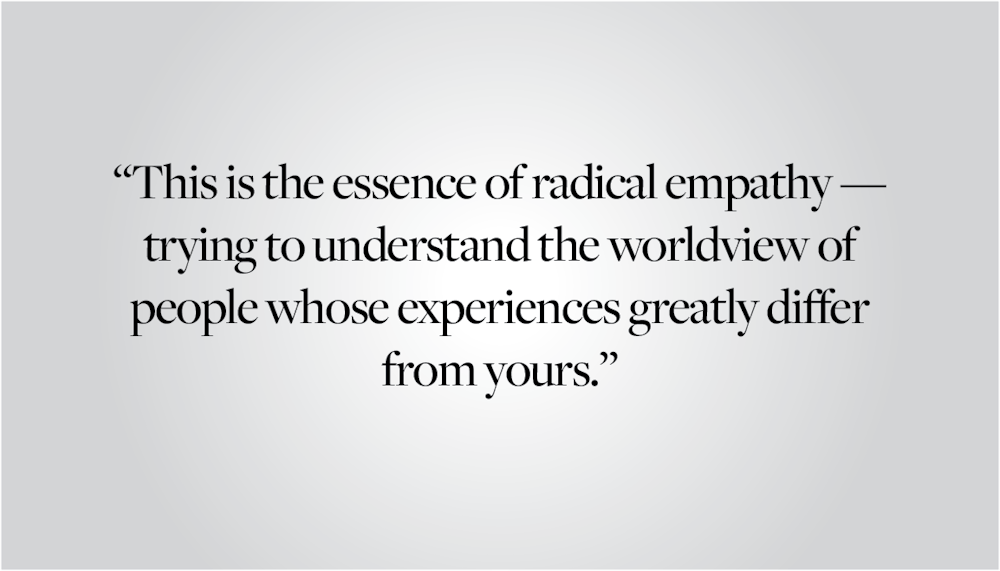Consider this alternate history: World War II has just ended and the U.S. surprisingly fails to stop Soviet communism from spreading past the Eastern Bloc. As a result, the USSR and Western Europe become close economic and military allies. Isolated and stuck with a faltering economy, the U.S. cedes to the rest of the world. A decade later, the U.S., still weakened and geopolitically embarrassed, elects a strongman leader. He clamps down on freedom of press and political opposition, but also stabilizes the economy and reestablishes the country on the global stage.
Years later, Canada, a historical ally of the U.S., elects a new prime minister who intends to strengthen relations with the USSR-European alliance and distance themselves from America.
Step into the shoes of an American in this scenario. It appears to you that the world is interfering with your country and way of life. Compounding these feelings, your state-run media – the only media you have – distorts and exaggerates Soviet-European aggression. Soon, your president announces an invasion of Canada to halt the international community’s encroachment and depose the “communist” Canadian government. Based on what you know, this plan seems reasonable.
This narrative might sound familiar. It is why a substantial number of Russian citizens support the invasion of Ukraine. While Russia is wrong to invade Ukraine, if you can understand how an American might feel about this fictional war in Canada, then you can understand many Russians today, regardless of how much you disagree with them. This is the essence of radical empathy — trying to understand the worldview of people whose experiences greatly differ from yours.
Radical empathy actively combats many of our cognitive biases. It fights the fundamental attribution error, which states that we ascribe other people’s actions to their personality and character, greatly discounting the power of context. It also defies our naive realism, which describes why we see ourselves as objective and most others as biased or incorrect. This thinking challenges our confirmation bias by compelling us to confront all available evidence, rather than selectively focusing on information that aligns with our existing beliefs.
This radically empathetic lens helps us understand that people, including soldiers in an opposing army, are not fundamentally good or bad — they are being pulled by complex motivations and situations. If you can understand and empathize with someone who supports an unjust war, then you can understand nearly anyone whom you dislike or are annoyed by in your daily life.
For example, say you are driving on the highway and, out of nowhere, someone zooms in front of you, nearly causing a crash. Your immediate assumption could be that they are an unsafe, careless and maybe just bad person. Equally likely, however, they could be rushing to a life-changing job interview or to their daughter’s dance recital. Regardless, you can likely recall times when you have driven recklessly. It wouldn’t be fair for other drivers to judge your character based on one lane change, so why shouldn’t they too receive the benefit of the doubt?
This kind of thinking is difficult and often feels unnatural. Fortunately, it can be practiced. When you have a strong disagreement with someone or encounter a view that you viscerally dislike, grab a pen and paper. Rate on a scale of 1-100 how confident you are that your view is correct and do the same for the view of your opponent. Next, write down at least five concrete pieces of evidence supporting each side. After that, reevaluate your confidence levels. This exercise may not change your mind, but it will force you to engage with and understand your opposition’s views. It also makes you acknowledge that, when confronted with all available evidence, you cannot be 100 percent certain that you are correct. This method is essentially self-administered cognitive behavioral therapy, a psychological technique that helps people overcome cognitive distortions. Doing an exercise like this will make you happier and cause you to have a more charitable and objective worldview.
Benjamin Aizenberg ’26 can be reached at benjamin_aizenberg@brown.edu. Please send responses to this opinion to letters@browndailyherald.com and other op-eds to opinions@browndailyherald.com.





